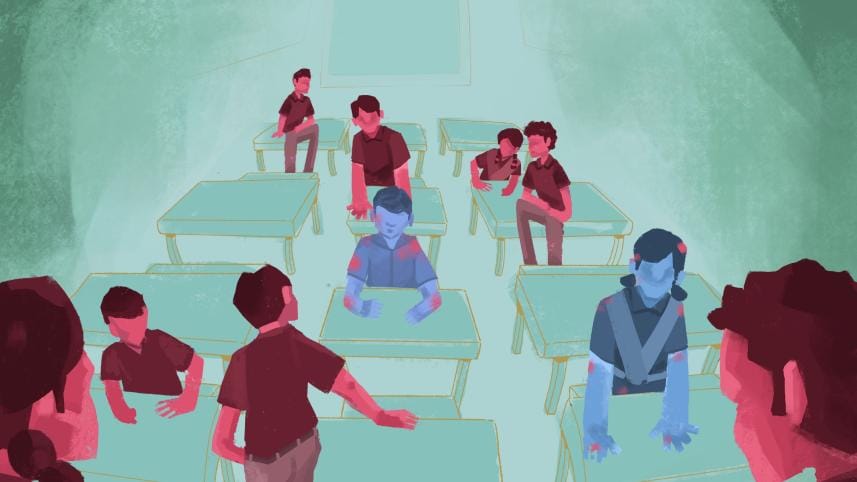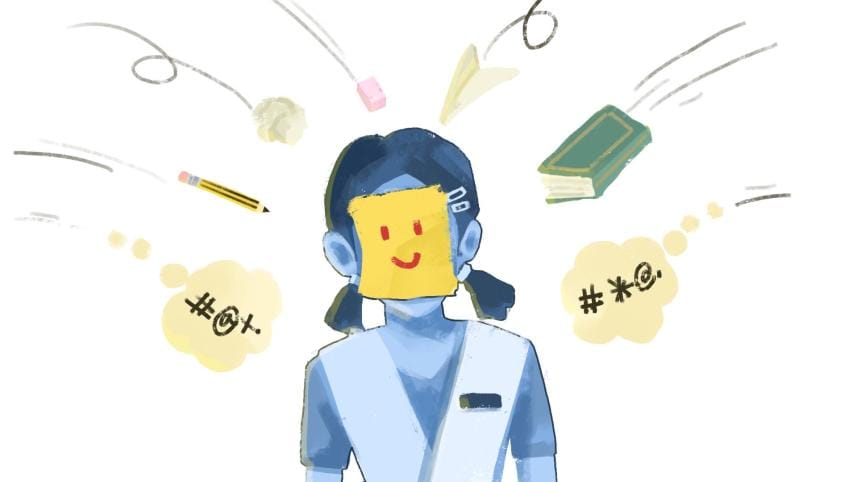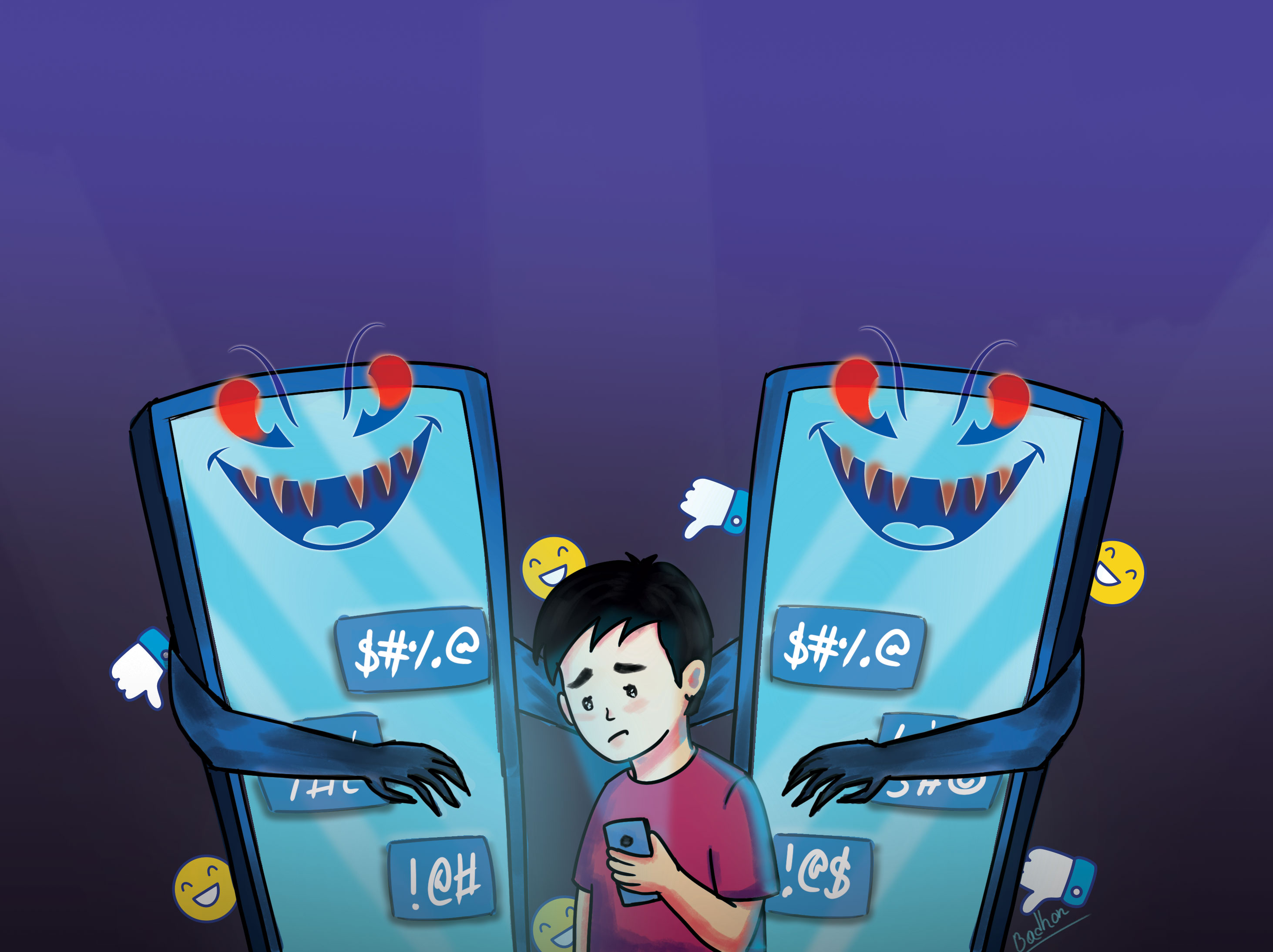The lasting scars of school bullying

Trigger Warning: Contains mention of physical, verbal, and psychological abuse.
As the school bell rang for tiffin break, Ramim quickly packed his bag, ran to the washroom, and locked himself in, hiding from the world around him. After the break, he quietly returned to class. Once school ended, he ran again, seeking solace behind a tree as if trying to disappear from everyone's view. He came home with a sad face each day, sometimes with fresh bruises on his knees. Yet, whenever anyone asked what was wrong, he sealed his lips, refusing to say a word.
Years later, as an adult, he is now struggling with self-doubt and anxiety. Recently, he decided to visit a therapist. During his session, he broke down in tears as he recalled the torment he went through in school, being bullied, body-shamed, and mocked for being thin and weak. He used to skip his tiffin breaks to avoid the bullies who would snatch his food, hit him after school, and ridicule him relentlessly; for no apparent reason. He couldn't share it with anyone back then.
Many children, from an early age, are bullied by their peers or seniors at school. Victims of such bullying are often unable to talk about their experiences because others may trivialise or dismiss them as nothing serious.
Bullying comes in many forms, including physical aggression, which can involve hitting or shoving, verbal abuse, like name-calling, teasing, or threats, as well as social manipulation, such as spreading rumors, exclusion, or intentional isolation. At present, bullying has found its way into the cyberspace as well. Bullying can frequently happen within friendship groups and is often dismissed as "banter".
"I remember I stopped going to school for a week after I got bullied for my height. Even though my school was very strict, they never cared enough about it," saidAshfaq*, a student of a renowned school in Dhaka.
Hasan*, now a university student, shared, "Back in school, I was often called names because I had a stutter. This severely damaged my confidence. As a result, I now find it very challenging to speak up in group settings or make new friends."
The US-based National Center for Education Statistics indicates that students who face bullying are more likely to achieve lower academic performance and are more likely to skip school. What makes bullying particularly damaging is that the victim or targeted person often feels powerless to defend themselves, leaving them vulnerable and isolated. Unlike a physical altercation, the emotional wounds of bullying linger, affecting the victim's self-esteem, social relationships, and mental health long after the bullying stops.
When a child grows up in environments like these, the effects of bullying can haunt them throughout their lives. They may become more introverted and often struggle with self-doubt and anxiety when trying to come out of their shells. Some individuals may choose to hide their true selves to avoid judgment.
Moreover, victims of bullying often struggle to concentrate in class. The fear of ridicule can lead to decreased participation and lower grades. This ongoing anxiety begins at an early age and has a significant impact on education.
Ariba*, a 25-year-old professional, shares her experience, "It started in sixth grade when I was mocked for being overweight. The constant teasing and name-calling made me feel invisible and worthless. Even now, I continue to struggle with body image issues and social anxiety in my workplace. I still think twice before posting pictures because the comments [made in the past] about me still haunt me."

One of the most common effects of bullying is anxiety and depression. Victims often carry the pain from their childhood experiences, remembering moments of embarrassment that lower their self-esteem and make it hard for them to trust others. In more serious cases, victims can develop post-traumatic stress disorder (PTSD), which is usually linked to life-threatening situations. The British Psychological Society says that about 15 percent of people who were bullied show symptoms of PTSD, which included having flashbacks, being overly alert, and feeling numb. Unlike physical injuries, these emotional scars can be hard to see and may go untreated.
Bullying also has a considerable effect on one's future academic and career success. The self-doubt that starts in childhood can make it hard for people to take on opportunities at work, discuss their pay, or feel confident about themselves at work.
"It all begins in school – the bullying and name-calling. At that age, children may not fully realise the emotional damage, but as they grow older, the impact starts to show. Many begin to question their self-worth, and without proper psychological support, this can eventually evolve into post-traumatic stress disorder," said Rakibul Hasan Sourav, a consultant psychologist (BS, MS in Psychology, Dhaka University).
Being bullied, or witnessing others being bullied, is not something that victims simply get over with time. It leaves a lasting wound and can significantly affect a person's life. There are countless stories of people who struggle with social anxiety, body image issues, and a lack of confidence, all because of the bullying they experienced early on in their lives.
Tackling bullying must start in schools. A zero-tolerance policy and student counselling are essential for every school. Teachers, parents, and peers must work together where kindness, respect, and inclusivity are encouraged and expected. Highlighting the need for early intervention, Rakibul*stated, "Schools must take preventive action through awareness campaigns by highlighting the long-term consequences of bullying before it leaves lasting scars."
Additionally, it is vital to equip children with the tools to recognise, report, and effectively combat bullying, as reactive measures are more important than proactive ones. Beyond what schools and organisations do, society needs to confront the normalisation of bullying and the silence around it. We can only break the cycle of harm by listening to the victims, sharing their stories, and acknowledging their feelings. Every conversation, act of kindness, and effort to help create an environment where no child feels weak or alone.
References:
PACER's National Bullying Prevention Center (2023). Bullying Statistics.
British Psychological Society. (2020). The Impact of Bullying on Mental Health.
*Names have been changed upon request
Nusrat Meherin Faiza is a writer, tutor, and chronic overthinker. Reach out to fuel her overthinking at nmfaiza15@gmail.com



 For all latest news, follow The Daily Star's Google News channel.
For all latest news, follow The Daily Star's Google News channel. 
Comments